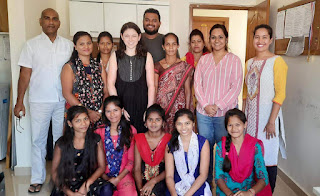“Children are like buds in a garden and should be carefully and lovingly
nurtured, as they are the future of the nation and the citizens of tomorrow.
Only through right education can a better order of society be built up.” - Jawaharlal Nehru
Education is a basic human right – a right that many in
developed countries take for granted. It is vital for a country’s development
and ensuring future opportunities for communities around the world. Education is
so essential to development that it is included as the 4th UN Sustainable
Development Goal, aiming to ensure inclusive and equitable quality education and
promote lifelong learning opportunities for all by 2030.
January 24th is the International day of Education, and in India it is also National Girl Child Day.
Both days were established to raise awareness of the disparities when it comes
to accessing inclusive and quality education. 17 percent of all children in
India drop out before finishing secondary school, and the number increases to 24
percent amongst poorer rural communities1, and typically girls leave school at a
younger age than boys. The most common reasons for children dropping out of
school is poverty, and the need to earn extra income to support the family.
Additionally, girls start to miss school when they begin menstruation, finding
that many schools do not have appropriate sanitation facilities to support them.
The start of menstruation may also lead to girls dropping out under societal and
familial pressure to be married. There are a number of reasons why children, and
especially girls may drop out of school, which is why 24th January is so
important. It is a day to highlight the importance of education and to remember
why we should be fighting for equal access, and good quality education for all
children.
Education is one of Gabriel Project Mumbai’s core principles. GPM
knows that unless there is a way to keep children in school, the cycle of
poverty will continue. The reality of the situation in the rural villages and
slums means that many children do not have access to adequate resources or
facilities. There is also a lack of trained teachers in these communities, and
growing class sizes, meaning that the student to teacher ratio in some schools
is 60:1. These are just some of the reasons why GPM has created a space where
children can come and learn safely and with the right level of support. In the
Kalwa slum, GPM runs a school which employs and trains teachers from the local
community. These teachers know the students well and can identify which families
are most in need of further support. The students enrolled at the school are
given lessons in addition to the time they spend at the government schools. Here
they have a clean space to learn in, and smaller class sizes to make sure their
needs are being met. They are also provided with a daily cooked nutritious meal
and regular health check-ups because statistically children who are hungry or
sick perform worse in school and may drop out. GPM also runs schools in the
tribal villages as well as providing additional staff in the government schools
in the area, where access to education is even more restricted and without GPM
many children would not be able to attend school at all.

One of the GPM Love2Learn classes engaging in experiential learning with a
volunteer
When I was working for GPM, I got to see first-hand the amazing and thoughtful
initiatives they run. I was working as an intern and was welcomed into the
communities with open arms. Everyone was so friendly and helpful, and despite
the language barriers, I formed true connections. One of my main roles was to
support and run programmes for the international visitors who come to volunteer
with GPM. Many of the visitors come and teach in the schools, and I loved seeing
the children’s faces light up when young people from all over the world wanted
to come and spend time with them. The visitors run creative, informal style
classes that introduce the children to problem solving and creative thinking,
without relying on the textbook. This is an aspect of school that I definitely
took for granted, and because of strains on the Indian school system, often
children do not have the possibility in the classroom to think outside the box.
I have had the opportunity to see the extraordinary impact GPM’s work has on the
children and their families, and it was incredible to be part of this fantastic,
thoughtful organisation. All of the work that GPM does with the school children
helps them to feel valued and supported, and the results of the students have
improved. From clean learning spaces and additional teachers, to visitors who
bring new and fresh ideas, GPM works tirelessly to give these children a better
future. In a year when the coronavirus pandemic has intensified the disparity in
access to education, and further highlighted how much we all take learning for
granted, supporting GPM and the vital work that they do couldn’t be more
important.
1.https://www.education.gov.in/sites/upload_files/mhrd/files/statistics-new/ESAG-2018.pdf
Meiron and some of the GPM India team
Meiron Avidan was born in South Africa and grew up in London. She studied
Sociology and Social Policy for her undergraduate degree, and when she
graduated she knew she wanted to work abroad to further her understanding of
international development work and have the opportunity to immerse herself in
a new culture. Meiron worked for GPM as a development intern from September
2019 until July 2020. Since September 2020, she has been studying for a
masters in development studies, with the hope of starting a career in
international development.





